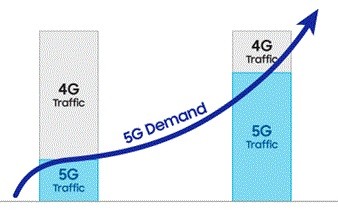DSS dynamically assigns time-frequency resources between 4G and 5G according to their respective traffic demands to accommodate both users, while optimizing resource utilization. In the early stages of 5G, DSS is advantageous in that it only allocates the required amount of resources for 5G users, and retains the remaining resources for 4G users. As the demand for 5G grows over time, DSS can allocate more resources to 5G services.
With DSS, 5G is able to share the frequency bands used by 4G, allowing operators to swiftly expand 5G coverage while eliminating the need for new spectrum allocation for 5G.
Samsung’s DSS technology has been deployed commercially in the U.S. over a virtualized 5G RAN. The Samsung DSS solution can be used on both traditional hardware-based and also virtualized-based radio networks, enabling the maximum flexibility for customers.
Samsung has pioneered the successful delivery of 5G end-to-end solutions including chipsets, radios, and core network technologies. The company supports 5G commercial services in the world’s leading markets, including Korea, the U.S. and Japan. In addition, the company is rapidly expanding its global footprint to new markets including Canada and New Zealand.






